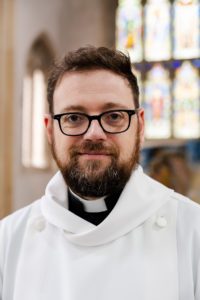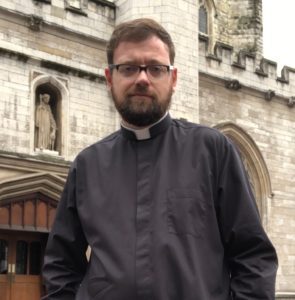Alex is a former student at St Augustine’s, and is currently non-stipendiary curate at St Giles Cripplegate, in the City of London.


We asked him to tell us a bit about what life is like as a curate, and how his experience at St Augustine’s helped to prepare him. As well as my curacy work, I work full-time for the digital team of the Church of England. (So one of the things I have to say is that everything written here is my opinion – not necessarily theirs.)
St Giles Cripplegate is right in the heart of the Barbican, and I live close enough that it’s possible to combine my day job with curacy work in the evenings and at weekends. As a curate, I Deacon at Communion services, preach, and run confirmation classes. I also assist in baptisms and take funerals. I am currently running a course on the Lord’s Prayer. My pastoral role involves visiting parishioners, and I sit on the board of a community centre in Islington. I also take morning assemblies at the local school and am involved with our children’s Sunday club. As a City church we also have links with livery companies.
In my work for the Church of England digital team, I work on A Church Near You, the Church of England’s online Church Finder Tool and am involved with the National Sunday service that’s been going out online during the pandemic.
When my DDO originally found this curacy for me I was pleased because it was on my route between home and work – but that was in my previous job! It’s an important consideration though – if you are SSM, your curacy needs to be a viable commute from home, as you will often be needed in the evenings.
How did St Augustine’s prepare you for life after ordination?
I think I had very grounded training from St Augustine’s, which included my Masters degree. The Principal, Alan, was my tutor. He was excellent.
The college offers many different styles of worship during your training, so you get a varied experience of worship. This is ideal for London churches where there’s quite a mix of styles, so it helps if you know the different traditions within the Church of England.
I also think there are massive benefits to non-residential training, as the need to juggle work and home life with study equips you very well for real life as a curate.
At the moment, I have a career with the Church of England. I’m really interested in the role of digital technology in Church, and how we’re now able to communicate our message. It can make us more present in people’s lives. I’m considering military chaplaincy when I finish my curacy, though, and having the experience of managing multiple workloads equips you really well to deal with the kind of pressures you get in that role. I’ve met with various chaplains and some are in organisations where many others have a 9 to 5, but they don’t.
During this Covid-19 pandemic I’ve been supporting the chaplain of a Central London hospital whilst they are under so much pressure. (Obviously this is subject to current guidance from the Bishops.) If we are to be there for people in the community, this is it. When people are in hospital, or involved in a conflict, these are the kind of places where they need us. The world is our church, so we need to be out there in the world where people are.

